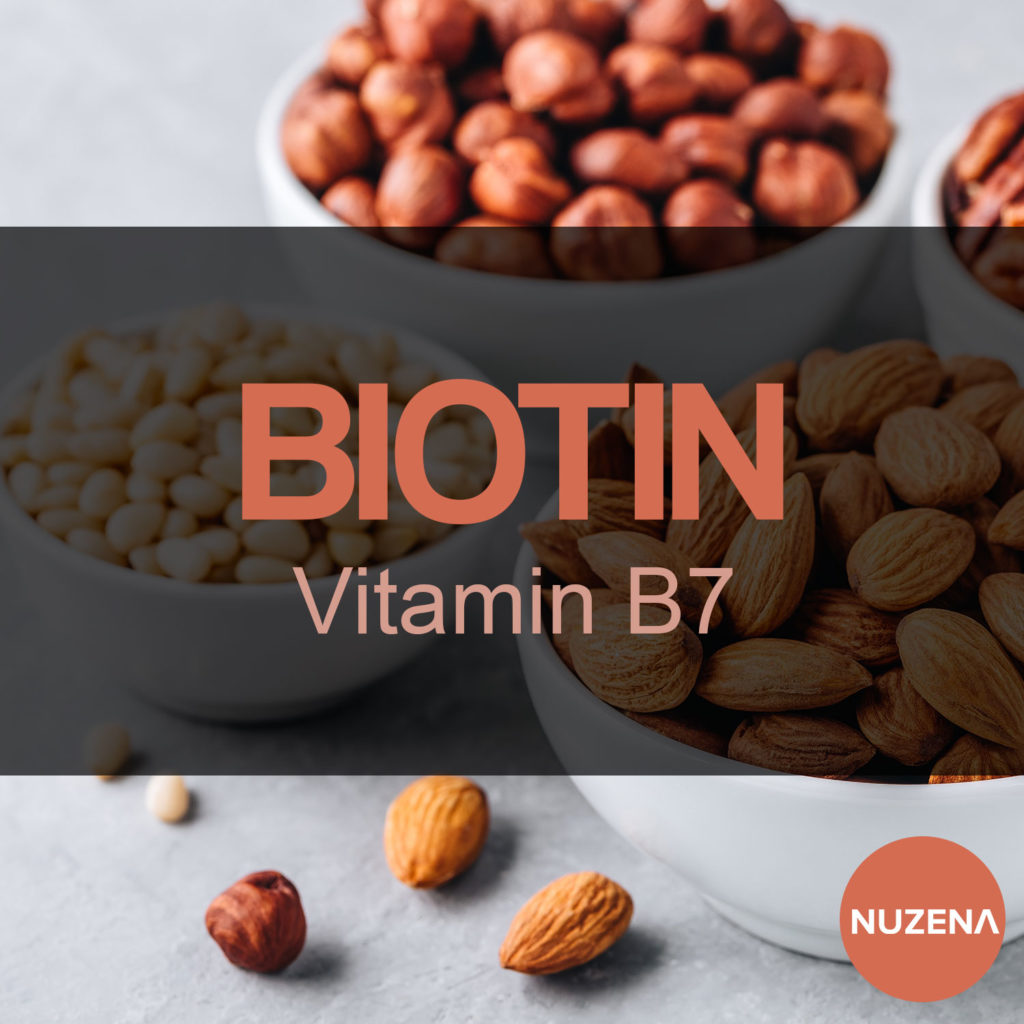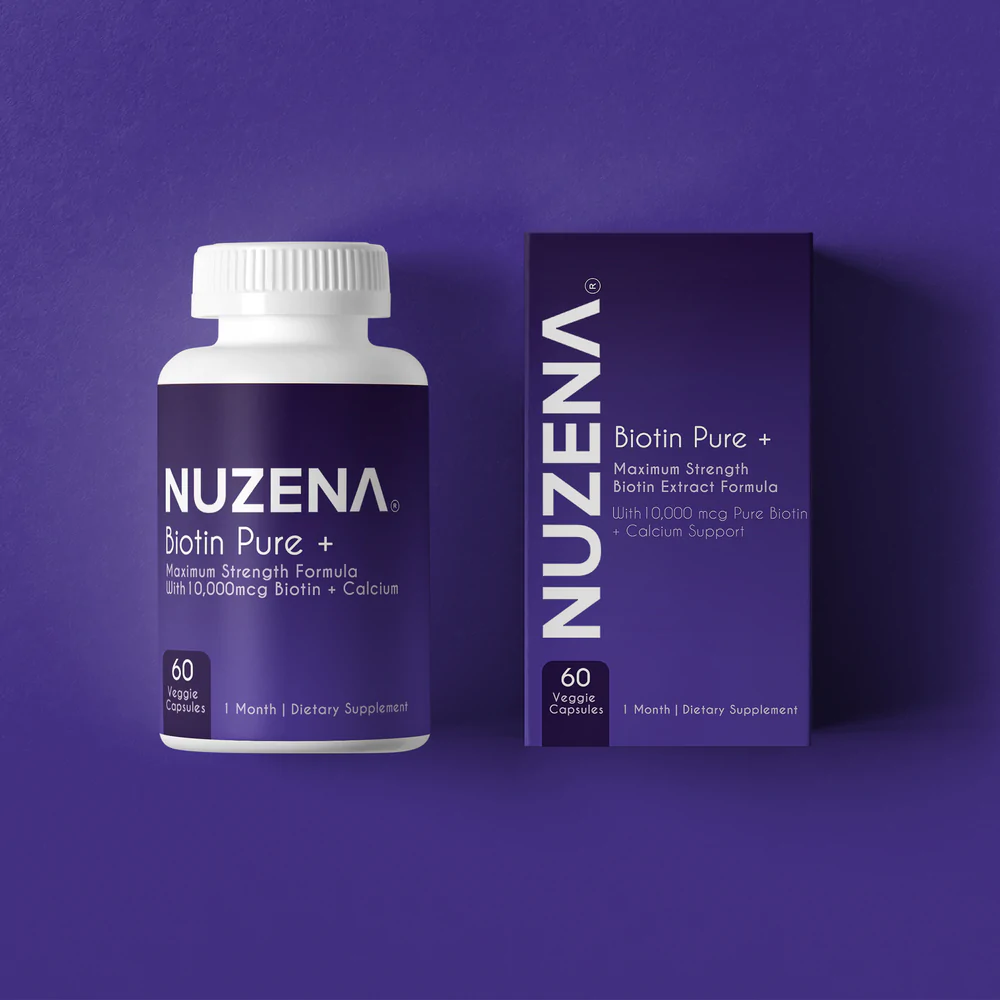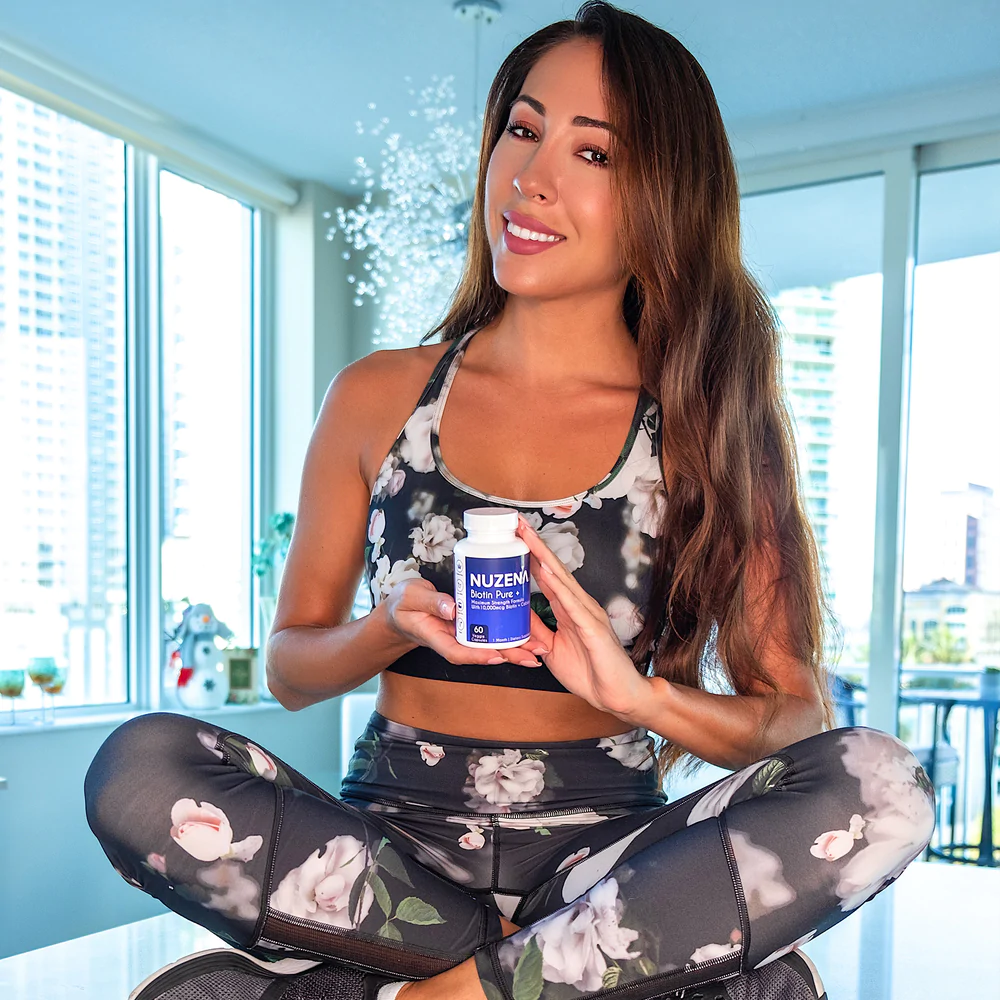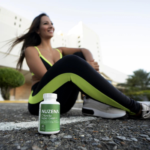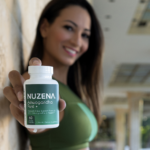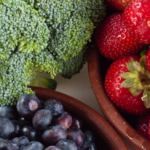
Written by Melanie Bertaud, Certified Detox Specialist – Reviewed by Sam Thomas, BSc Biology (Hons.)
Last updated: November 7, 2019
What is Biotin?
Biotin, Vitamin B7, is known as the beauty vitamin because it is essential for thick hair and strong nails… but you might be surprised to know that it also protects your immune system, helps you absorb nutrients, and could lower your risk of chronic illness.
We’ve scoured medical literature to bring you 13 proven benefits of biotin – for your health and your beauty.
13 Proven Health Benefits of Biotin
1 Biotin may help to lower your risk of diabetes
Diabetes is one of the most pressing health epidemics we face, with over 100 million Americans suffering as a result of it (1). Diabetes happens because we’re eating too much sugar. Sugar (or a sugar-rich diet) spikes blood sugar levels, which in turn spikes insulin levels (insulin is the hormone that helps your cells absorb glucose from the blood). Over time, your body stops responding to insulin and becomes insulin-resistant. This is the first step towards type 2 diabetes.
As a diabetic, it is incredibly difficult to manage blood sugar levels because the body is no longer able to regulate that process properly. As a result, blood sugar levels can soar, which ends up damaging your blood vessels and nerves. Diabetes also puts you at higher risk of heart disease.
An animal study published in the Journal of Nutritional Biochemistry observed that biotin can play a role in the prevention and treatment of diabetes because of its effect on insulin and the pancreas.
Researchers found that mice that were fed a biotin-rich diet had more insulin-producing pancreatic cells than mice fed a normal diet. They also noted that their glucose tolerance improved after 8 weeks. (2)
In another study, researchers noted that fasting blood glucose was reduced by up to 45% in type 2 diabetic patients taking 9mg of biotin daily for 30 days. (3)
Balanced blood sugar levels are essential for the prevention of diabetes. If you have diabetes, improving the way your body reacts to glucose is a vital part of helping manage and even reverse the condition.
Summary: Biotin helps your body to regulate blood sugar levels and insulin production, which can help prevent and reverse type 2 diabetes.
2 Bitoin may help to reduce the risk of heart disease
As we’ve seen, high levels of blood sugar increase your risk of diabetes and make the condition harder to manage. But they also put you at higher risk of heart disease, because having a lot of sugar in the blood increases inflammation in the blood vessels. The body produces fatty deposits as an attempt to repair the damage caused by inflammation, and this creates the conditions for cardiovascular problems. In the same way, high levels of cholesterol and triglycerides in your blood put you at higher risk of heart attacks, strokes, and high blood pressure.
To keep heart disease at bay, it is essential to tackle the amount of sugar and fat in your blood. This is where biotin can help.
A study published by the Oman Medical Journal observed the effect of biotin on patients with Type 1 diabetes. Seventy patients were split into two groups. One was given a placebo, the other was given 2mg of biotin every day for three months. After three months, fasting blood glucose, triglyceride and cholesterol levels were analyzed. While the placebo group saw their blood lipids increase slightly, the biotin group’s lipid levels decreased.(4) They also noted a marked improvement in fasting blood glucose levels. This led researchers to conclude that biotin can help lower the risk of heart disease.
Summary: Biotin reduces fasting blood sugar levels as well as blood levels of triglycerides and cholesterol, thereby reducing your risk of heart disease..
3 Biotin may help to reduce inflammation
Did you know that chronic inflammation is at the root of most lifestyle diseases, from heart disease to cancer?
Chronic inflammation happens when your body comes under too much stress (from inflammatory foods like sugar, gluten, dairy, fried foods, as well as pollution and chemicals in everyday self-care and household products). Your immune system naturally tries to protect you from these toxins by launching its defense mechanism: inflammation. In the short term this is beneficial (like the short-term inflammation that happens when you cut your finger, for example). However, if the toxins keep coming, inflammation becomes chronic, and this can lead to a wide range of problems, like depression, frequent infections, exhaustion, and eventually chronic disease like cancer and autoimmune conditions.
Scientists examined the link between biotin and the body’s inflammation response in a study published in the American Journal of Physiology. They found that biotin has an impact on the function of dendritic cells. These are the immune system’s primary responders to infection, found mostly in the gut lining and under the skin. They detect intruders and launch an inflammatory response to eliminate it. However, with biotin deficiency, this process becomes dysregulated: dendritic cells launch inflammatory responses when they are not needed, inflammation becomes chronic, and this can lead to autoimmune conditions (like Chron’s disease, multiple sclerosis, rheumatoid arthritis).
The researchers concluded that ensuring adequate intake of biotin protects dendritic cells, helps prevent chronic inflammation, and balances the immune system.(5)
Summary: Biotin deficiency promotes inflammation. Adequate biotin intake can prevent inflammation and and may help to provide support for autoimmune conditions.
4 Biotin may help to prevent hair loss
Hair loss can be a real blow to our confidence. It is natural to lose a little hair thickness as we age, but some hair loss is preventable.
There are many factors involved in hair loss, from hormone imbalances to thyroid conditions, and even skin conditions like seborrheic-like dermatitis. This particular scalp condition is linked to biotin deficiency.
A study carried out by the Official Journal of the Hair Research Society in India examined the role of biotin in hair loss and scalp health. The researchers tested 541 women complaining of hair loss and found that 38% of them were biotin-deficient. Those treated with 5mg/day of biotin for 3 months saw their hair grow thicker and their scalp clear up (6).
In another study, published in the Journal of Clinical and Aesthetic Dermatology, researchers split women with thinning hair into two groups. One was given a placebo, the other was given a supplement containing biotin. After 90 days, hair count had doubled for the group taking the supplement, compared to no change for the placebo group (7). After 180 days, participants reported their hair felt shinier and moisturized.
Summary: Biotin deficiency can be a factor in hair loss due to seborrheic-like dermatitis. Supplementing 5mg of biotin a day for 3 months cleared scalp condition, prevented related hair loss and improved hair condition.
5Biotin help to keep your DNA healthy
Biotin has a role in gene expression – over 2000 human genes are affected by how much biotin you have in your system. Your genes are contained in your DNA. This DNA is constantly replicating to create new cells for your body. A healthy DNA is vital for longevity and health.
Without enough biotin, cellular breakdown byproducts build up in the cells, causing an increase in reactive oxygen species (also known as free radicals).(8) Free radicals are implicated in DNA damage. When DNA is damaged, it creates cells with mistakes or mutations, which turns into premature aging, and even cancer. Biotin helps to clear toxic build-up within cells, thereby reducing the damage by free radicals.
Research supports the theory that biotin is essential to maintain healthy DNA. The healthier your DNA, the slower you age.
Summary: Biotin deficiency causes a build-up of DNA-damaging free radicals. Keeping your levels topped up could prevent premature aging.
6Biotin may help to strengthen your immune system
The stronger your immune system, the better able it is to attack and eliminate germs and viruses before they develop into colds and coughs. A weak immune system means you’re more vulnerable to seasonal viruses, and it might take you longer to recover from illness.
Biotin helps your immune system function by affecting certain immune cell pathways. It supports your natural killer cells (your immune system’s number one helpers), helps create cytotoxic T lymphocytes (these are white blood cells that attack cancer cells and cells that are infected with viruses), and helps your immune cells to mature and to respond effectively to intruders.(9)
Summary: Biotin can help you keep colds and flus at bay by strengthening your immune system’s ability to produce healthy white blood cells.
7Biotin may help your gut absorb more nutrients
There’s a saying that goes: you are what you eat. But actually, you are what you absorb. Eating quickly, being stressed, and poor gut health means most of us don’t absorb as much of the nutrients from our food as we could.
Biotin is a co-enzyme for carboxylase enzymes that are involved in many metabolic reactions to do with how you break down and absorb your food:
- fatty acid synthesis: this is when the body creates fatty acids from food – fatty acids are essential for healthy skin and hair – hence the beauty connection – as well as proper brain function.
- branched-chain amino acid catabolism: this is the breakdown of the amino acids leucine, isoleucine and valine, which are essential for wound healing, muscle building, and helping the body to cope with stress.
- gluconeogenesis: this is the body’s creation of glucose from protein and fat – glucose then stimulates cells to produce ATP – your body’s main source of energy.(10)
When you get enough biotin, you support these processes and therefore help your body make the most of the nutrients in your meals.
Summary: Your cells need biotin to break down food into absorbable nutrients. Biotin supplementation may help you to get more from your meals.
8Biotin helps you to maintain healthy skin
Did you know that biotin is also known as Vitamin H? H stands for Haar und Haunt, which is German for “hair and skin”, because it plays a role in various metabolic reactions involved in the maintenance of healthy skin and hair.(11) This is why you’ll find biotin in many cosmetics and shampoos… that said, there isn’t much conclusive evidence on the topical use of biotin. For it to have any impact, it has to come from inside.
Biotin deficiency is also understood to cause skin problems – rashes in particular. This is because the body needs biotin to produce fats that keep skin healthy and supple. Without enough of these fats, skin becomes dry, flaky, and irritated. That’s why getting enough biotin, from your diet or by supplementing, is essential for healthy, glowing skin.
Summary: Biotin helps the body produce fats that keep skin supple and moisturized. Including biotin into your beauty regime can help give you that glow.
9 Biotin is essential for fetal development
Pregnant women need more biotin than other people. Scientists have found that during pregnancy, the body uses up more biotin. This is because it is busy creating a new life, from gene formation to nervous system development.
As we’ve seen, biotin plays a role in DNA expression, as well as fatty acid production (essential for brain and nervous system). What’s more, animal models show that a biotin deficiency can cause fetus malformations.(12) This has led researchers to suggest that pregnant women would benefit from ensuring their diets are higher in biotin-rich foods.(13)
Summary: Biotin helps the body produce fats that keep skin supple and moisturized. Including biotin into your beauty regime can help give you that glow.
10Biotin may help to reduce symptoms of inflammatory bowel disease (IBD)
Inflammatory bowel diseases are caused by the immune system overreacting to harmless bacteria in the digestive tract. This causes chronic inflammation and ulceration of the intestinal wall. IBDs are characterized by cramps, bloating, and diarrhea – if you suffer from an IBD, quality of life is severely impaired.
A study published in the American Journal of Gastroenterology found that patients suffering from inflammatory bowel diseases (like Chron’s colitis, ulcerative colitis and Chron’s disease) have lower levels of vitamins compared to people with healthy bowels – one of these vitamins was biotin.(14) This is no surprise considering biotin helps your immune system to have a normal inflammatory response. What’s more, biotin is produced in the gut – when the gut is damaged, it is less able to produce biotin, and the less biotin is produced, the higher the likelihood of IBD.
Topping up your levels of biotin, as well as ensuring you get enough other vitamins, can help you to manage your IBD, reduce your inflammation and get fewer symptoms.
Summary: Biotin deficiency is linked to an increased risk of IBD. Taking biotin supplements will top up your levels and could help manage your symptoms.
11Biotin helps to keep your nails strong, healthy, and beautiful
Many of us hide brittle nails behind nail varnish or acrylics, and as a result our nails get weaker and weaker. Biotin could help you achieve stronger nails naturally.
You might have noticed that most skin, hair and nail supplements contain biotin. Why? Because, as we’ve seen, biotin is an essential part of certain metabolic pathways involved in keeping your nails healthy.
Last century, vets noticed that damaged horses’ hooves healed if the animal was given biotin. Hooves are a keratin-structure, just like human fingernails, and this led scientists to question whether the same effect might be observed. It was. In a German study evaluating the effect of biotin on nail health, 71 women suffering from brittle nails were given 2.5mg of biotin to take every day. After three months, 91% showed definite improvement with firmer and harder nails.(15)
Summary: A biotin supplement may help strengthen your nails in as little as 3 months.
12Biotin can help reduce cradle cap in newborns
Biotin may also be beneficial beyond pregnancy. Newborns are prone to get skin conditions, particularly cradle cap (or infantile seborrheic dermatitis), which is characterized by oily, flaky patches on the scalp.
If you are breastfeeding, taking biotin may help you help clear up your baby’s scalp. Back in the 1940’s, a scientist proved that adding foods rich in biotin to a breastfeeding mother’s diet reduced the symptoms of cradle cap in her child.(16) However, no modern study has looked into this. Other research has shown that biotin deficiency can make cradle cap more likely.(17)
Summary: Biotin deficiency can contribute to your child’s cradle cap. If you’re breastfeeding, taking enough biotin could help you clear up your baby’s scalp.
13 Biotin helps to support healthy brain function
Your brain health depends on something called myelin sheath – this is a fatty substance that surrounds nerves and helps them to communicate. If myelin sheath is damaged or there isn’t enough, your nerves are not able to communicate as effectively. Biotin is needed for the formation of myelin sheath, and scientists have found that biotin deficiency can impair its formation.
This is one of the reasons why biotin has been studied as a potential treatment for multiple sclerosis (an auto immune condition where the body attacks myelin sheath). Small studies have indicated that high doses of biotin (between 100 and 300mg per day) are effective at halting the progression of MS and even reversing some of the symptoms.(18)(19)Larger studies are needed to confirm these findings.
Biotin deficiency is also associated with neurological symptoms such as poor muscle coordination, seizures and learning disabilities. Studies find that these conditions can be reversed with biotin supplementation.(20)(21)
Summary: Biotin is an essential component of your myelin sheath. Ensuring you have adequate levels can protect your nerves and brain from damage.
Biotin Deficiency
1 Who is at risk of Biotin deficiency?
Biotin deficiency is rare, given that it is present in many foods. What’s more, the body produces its own biotin in the gastrointestinal tract.
That said, because it is produced in the GI tract, any dysbiosis (when bad bacteria outnumber the good bacteria in the gut) or inflammatory bowel disease can result in biotin deficiency. Excessive use of antibiotics also wipes out gut bacteria and can result in biotin deficiency.
High intake of avidin, which is found in raw egg whites, can cause biotin deficiency because it binds with biotin and stops its absorption. The simple way to avoid this is to stay away from raw egg whites. Cooked eggs are fine, since avidin becomes inactive when cooked.
You are more likely to be biotin deficient if you:
- Smoke (22)
- Are on parenteral nutrition (23)
- Have had a partial gastrectomy
- Take antiepileptics (24)
- Take isotretonion for acne(25)
- Take a lot of antibiotics (they destroy the biotin-producing bacteria in the gut)
- Consume alcohol excessively (this inhibits biotin absorption)
- Are pregnant or lactating (your body uses up biotin faster at these times)
Summary: People who are deficient in Biotin may find Biotin supplements useful if they struggle to get enough of it directly form their diet.
2What are the symptoms of Biotin deficiency?
- Brittle nails
- Thinning hair
- Loss of body hair
- Skin rash or infections
- Depression
- Tiredness
- Pins and needles in hands and feet
- Seizures
- Poor muscle coordination
Recommended Dosage
1Biotin recommended daily dosage
Because biotin is present in many foods and deficiency is rare in people eating a balanced diet, there is no recommended daily allowance of biotin.
The adequate intake for biotin is set at 30 mcg (micrograms) for women and men over the age of 19, and 35 mcg for breastfeeding women.(26)
In research studies, researchers prescribed doses from 2 mg (milligrams) per day up to 200 mg of biotin per day without any negative side effects.
Summary: The recommended dosage of Biotin can vary depending on your current levels. If you are seeking a consistent amount of daily Biotin, consider adding Biotin supplements to your diet.
Is Biotin Safe?
1Biotin Safety
There is no known toxicology for biotin, so it is safe to take even at high doses. Studies have found no toxic effect even at doses as high as 200mg/day.(27)
However, biotin can interact with certain anticonvulsant medications. So it is important to speak to your doctor about biotin supplementation, especially if you are taking pharmaceuticals.
Final Thoughts on Biotin
1Biotin summary
So it turns out that biotin is much more than just a beauty vitamin – it helps balance your blood sugar levels, keeps your cholesterol in check, helps you absorb nutrients, and may help to keep chronic disease at bay.
There are several foods that are rich in biotin that you can add to your diet.The following foods are good dietary sources of biotin:
- Nuts, almonds, peanuts, pecans, walnuts
- Sweet potatoes
- Legumes and beans
- Whole grains
- Cauliflower
- Bananas
- Mushrooms
- Brewer’s yeast
- Cooked eggs
- Sardines
If you’re looking for a great all around Biotin supplement then consider trying ‘Nuzena’s Biotin Pure +’. Biotin Pure + supplement contains 10,000 mcg of biotin in an easy to take capsule which can meet all of your daily biotin requirements.
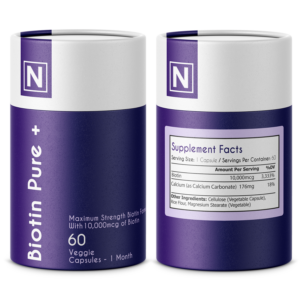
References
- https://www.cdc.gov/media/releases/2017/p0718-diabetes-report.html
- https://www.ncbi.nlm.nih.gov/pubmed/22841397
- https://www.jstage.jst.go.jp/article/jcbn1986/14/3/14_3_211/_article
- https://www.ncbi.nlm.nih.gov/pmc/articles/PMC3679599/
- https://www.physiology.org/doi/full/10.1152/ajpcell.00141.2016
- https://www.ncbi.nlm.nih.gov/pmc/articles/PMC4989391/
- https://www.ncbi.nlm.nih.gov/pmc/articles/PMC3509882/
- https://www.ncbi.nlm.nih.gov/pubmed/26158509?dopt=Abstract
- https://www.physiology.org/doi/full/10.1152/ajpcell.00141.2016)
- https://www.physiology.org/doi/full/10.1152/ajpcell.00141.2016
- https://www.ncbi.nlm.nih.gov/pmc/articles/PMC4989391/
- https://www.ncbi.nlm.nih.gov/pubmed/2500847?dopt=Abstract
- https://www.ncbi.nlm.nih.gov/pubmed/2648686
- https://www.ncbi.nlm.nih.gov/pmc/articles/PMC4230206/
- https://www.ncbi.nlm.nih.gov/pmc/articles/PMC4230210/
- http://www.whfoods.com/genpage.php?tname=nutrient&dbid=42
- https://www.ncbi.nlm.nih.gov/pmc/articles/PMC4230206/
- https://www.ncbi.nlm.nih.gov/pubmed/25787192
- https://www.ncbi.nlm.nih.gov/pmc/articles/PMC5098693/
- https://www.ncbi.nlm.nih.gov/pubmed/18545994
- https://journals.sagepub.com/doi/abs/10.1177/0883073807300307
- https://www.ncbi.nlm.nih.gov/pubmed/15447901
- https://www.ncbi.nlm.nih.gov/pubmed/3923177
- https://www.ncbi.nlm.nih.gov/pubmed/9371938
- https://www.ncbi.nlm.nih.gov/pubmed/10325581
- https://ods.od.nih.gov/factsheets/Biotin-HealthProfessional/#h2
- https://ods.od.nih.gov/factsheets/Biotin-HealthProfessional/#h2

